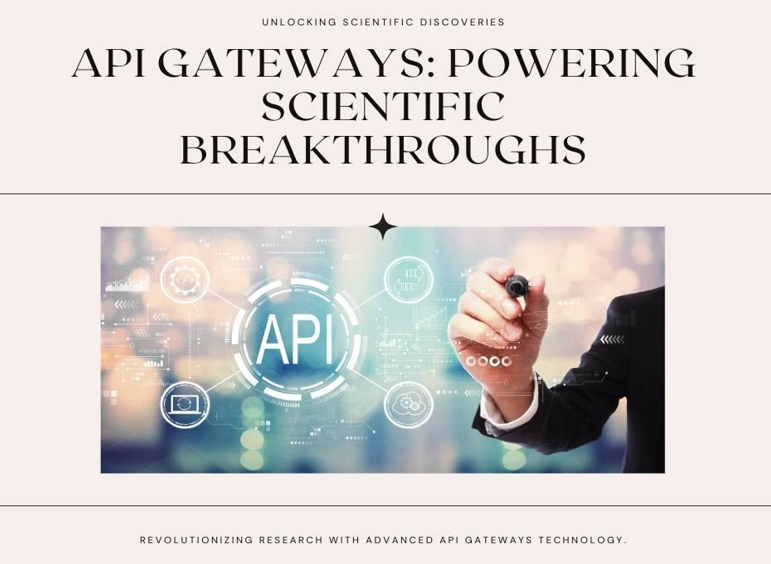
In an age where data reigns supreme, the acceleration of scientific discovery hinges on our ability to harness and integrate vast streams of information. Anusha Kondam's insights reveal how the revolutionary impact of API gateways bridges the gap between data and discovery while transforming scientists' approaches to collaboration, workflow automation, and access to computational resources. These innovations are paving the way for advancements across various disciplines.
Harnessing the Power of API Gateways
API gateways have emerged as a cornerstone in the modern scientific landscape, facilitating seamless access to vast repositories of data, computational resources, and analytical tools. By providing a structured interface, these gateways allow researchers to access and integrate data from disparate sources, driving interdisciplinary collaborations that were previously unimaginable.
API gateways, like the National Cancer Institute's Genomic Data Commons (GDC) API, have revolutionized data integration and accessibility in cancer research. The GDC API supports over 100,000 users and accelerates personalized treatment strategies by providing access to harmonized genomic datasets, making it indispensable in cancer research.
Accelerating Computational Access
Beyond data integration, API gateways also play a pivotal role in providing access to computational resources. For instance, the National Science Foundation's Extreme Science and Engineering Discovery Environment (XSEDE) API offers researchers access to supercomputers, storage systems, and visualization tools. In 2020 alone, XSEDE supported over 7,000 research projects, providing more than 20 billion CPU hours to researchers across various disciplines.
Anusha Kondam's exploration into this area highlights how API gateways democratize access to these advanced resources. Traditionally, access to high-performance computing was limited to large institutions, but API gateways have opened these capabilities to a broader range of researchers. This shift has enabled research in fields such as drug discovery, climate modeling, and astrophysics, accelerating the pace of scientific breakthroughs.
Enhancing Workflow Automation and Reproducibility
Another key innovation discussed is the role of API gateways in workflow automation and reproducibility. Scientific workflows often involve multiple steps, from data acquisition and preprocessing to analysis and visualization. API gateways enable researchers to automate these workflows, significantly reducing the time and effort required for complex analyses.
The Galaxy API is a prime example of this innovation, allowing researchers to create, execute, and share reproducible bioinformatics workflows. With over 12,000 registered users and more than 8,000 publicly available workflows, the Galaxy platform has transformed bioinformatics research.
Fostering Collaboration and Knowledge Dissemination
The research also shares insights into how API gateways facilitate collaboration and knowledge dissemination within the scientific community. The Open Science Framework (OSF) API, with over 300,000 research projects and participants from 2,500+ institutions, promotes transparency and open science practices.
Moreover, API gateways are playing a crucial role in citizen science initiatives, enabling public participation in research across various disciplines. The Zooniverse API, which supports projects from astronomy to ecology, has engaged millions of volunteers in data collection and analysis, contributing to over 500 scientific publications.
Looking Ahead: Challenges and Future Directions
While innovations driven by API gateways continue to evolve, they come with their own set of challenges. Standardization across APIs remains a significant hurdle, with interoperability issues hindering seamless data integration. Efforts toward developing common data models and ontologies are essential to overcoming these challenges.
Additionally, robust security measures are crucial to protect sensitive scientific data from breaches and unauthorized access. It is important to implement stringent authentication mechanisms, data encryption, and compliance with regulations like GDPR to ensure data integrity and confidentiality.
Looking to the future, developing intelligent APIs that can adapt to user needs and provide personalized recommendations will be a key area of growth. Integrating machine learning and natural language processing techniques into API gateways promises to enhance user experience and accelerate scientific discovery.
In conclusion, API gateways are transforming scientific research by bridging the gap between data and discovery. These tools enhance data integration, computational access, and workflow automation, fostering greater collaboration across disciplines. Although challenges like standardization and security persist, API gateways hold immense potential to drive innovation. By adopting these technologies and addressing their challenges, the scientific community can unlock new frontiers in research and discovery. The evolving role of API gateways promises to revolutionize how researchers access, share, and analyze data, ultimately accelerating advancements across various fields of science.
ⓒ 2025 TECHTIMES.com All rights reserved. Do not reproduce without permission.




